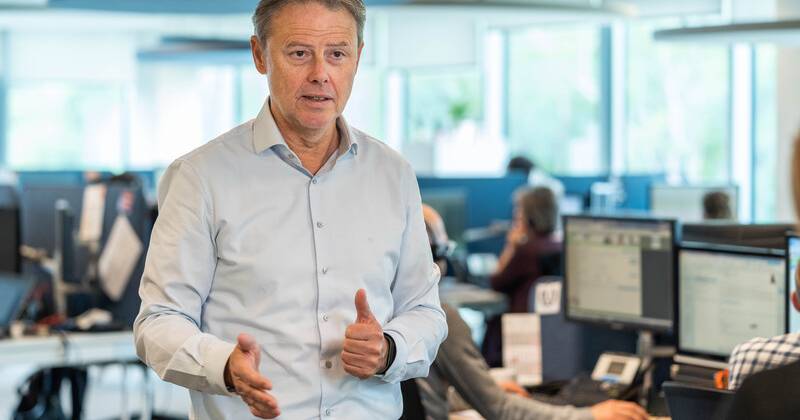‘You learn to invest your energy in the right things at the right time’
Stef Lauwers, CEO of Partena Ziekenfonds and partners, tried to enrol in Vlerick’s Advanced Management Programme on two separate occasions. Unsuccessfully so. His first attempt was frustrated by a merger. The second time around, he was forced to abandon after having to be resuscitated while out running. Fortunately, he lived to tell the tale, and as we all know three is the magic number. We reckon the Lauwers family’s motto is probably along the lines of “the future rewards those who keep going”.

SOCIAL ENTREPRENEURSHIP
“I’ve been the director of the Partena Health Insurance Fund since 1991. That’s a long time. I sometimes tell myself it’s too long even (laughs). During this period, the health insurance sector has become much more professionalised. I've witnessed merger after merger. This means you must constantly question your raison d’être and modus operandi. Our organisation has chosen to develop its own story, different to traditional health insurance funds. Our mission is to provide our customers, patients and the general public, with the right leverage to independently focus on their health and well-being. That is the point of our health insurance, but naturally we also have a wide range of other services. Like ‘Hulp in huis’, for example, our service voucher company for home care or cleaning services. Our childcare is another example: we run the largest number of childcare facilities in Flanders. These activities were first standalone, but were subsequently merged with our core business. In effect, this illustrates our mission: we want to be a business with a social impact.”
DEVELOP A SPECIFIC MINDSET
“I’m 59 years old, and was 57 when I did the programme. At this point in your career, you know how to go about certain things, and have acquired a certain level of seniority. So why did I enrol? It wasn't about learning more about the separate disciplines of management, marketing or HR. Rather, it was the integration of all these separate compartments that I found supremely interesting. They are examined individually and then combined, to give you a much broader insight.
You are forced not only to think, but also to do. And the lecturers always send you home with food for thought: think about how you intend to implement this, write it down, and share your experience next time. They say it takes three to six months to develop a habit. I’m starting to sense that a number of things have gradually become a habit.”
STOP PULLING ON THE GRASS
“Your mindset is expanded, which means you start investing your energy at the right time in the right things. One saying that stuck with me was that grass won’t grow any faster by pulling on it. Instead of micro-managing your team on those things that you think you know best, you should instead focus on helping people to spot the priorities and achieve a certain level. You don’t just achieve this by appealing to their brain. One thing that stood out for me was that Vlerick stresses the emotional aspect much more than the rational aspect. We experienced the importance of group dynamics first-hand during the programme, with very specific exercises."
LISTENING, A NEGOTIATOR’S BEST TOOL
“Empathy is the first tool at your disposal as a manager. Our lecturer, Katia Tielman, really emphasised this. I was bowled over by her course on negotiation. You are taught how important it is to really listen to what the person on the other side of the table has to say. To take a step back and take the time to understand what someone is actually saying.
My style is more assertive, and even, dare I say it, more aggressive. But I now really try to apply what I learnt during these courses. It's been a great help on a few occasions, including in a crisis situation we found ourselves in. During the negotiations around this crisis, I followed the textbook to a tee, and it worked.”
DON’T MONOPOLISE THE CONVERSATION
“Management programmes often have the reputation of gathering a bunch of big egos. And yes, we tend to be bigmouths. But the nice thing is that all the competitiveness is eliminated in the protective Vlerick environment. That is one thing the lecturers keep on telling you: it’s not about who’s best. It’s okay to fail now and then. That’s what the game is all about—and you can sense that everyone in the group is prepared to stick to the rules of the game. The lecturers also become part of the group, by the way. They’re extremely approachable, which I didn’t expect on such a high-level programme.”
SOMETIMES YOU WIN, SOMETIMES YOU LEARN
“I try to teach this to my children. You always learn, whether you win or lose. As long as you dare to look ahead and take the leap. We don’t have to be winners every day, but we do have to play the game.”
Get in touch!
Annelies Claeys
Project Manager New Business
